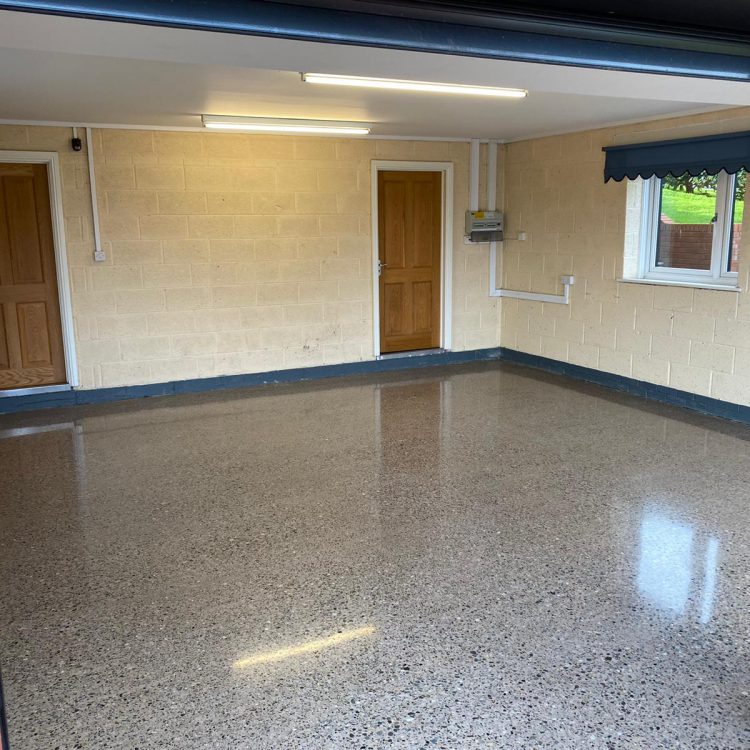POLISHED CONCRETE FLOORING
Polished concrete is a choice, for flooring because it offers both durability and visual appeal. Achieved by grinding and polishing surfaces this process creates a sleek and shiny finish that not only enhances the overall appearance but also extends the lifespan of the material.

Why Polished Concrete is important for floors?
- Surface Strength: Polished concrete significantly increases the surface strength of the flooring material, making it more resistant to cracking, chipping, and abrasion.
- Dust Reduction: The polishing process includes the use of densifiers that harden the concrete, reducing dusting and minimizing the release of concrete particles into the air.
- Chemical Resistance: Polished concrete is highly resistant to chemical damage from acids, oils, and other substances, making it suitable for environments where chemical spills may occur.
- Low Maintenance: Its smooth, non-porous surface is easy to clean and maintain, reducing the need for frequent maintenance and repairs.
- Reflectivity: The glossy finish of polished concrete enhances light reflection, reducing the need for artificial lighting and contributing to energy savings.
- Longevity: When properly installed and maintained, polished concrete can last for many years, providing a durable and cost-effective flooring solution.
- Cost-Effective: Polishing existing concrete surfaces eliminates the need for additional flooring materials, reducing both material costs and installation time.
- Sustainability: Polished concrete promotes sustainability by repurposing existing concrete slabs, reducing waste, and often incorporating eco-friendly products and practices.
- Customization: It offers various design options, including different levels of sheen, decorative scoring, and the ability to incorporate colors or aggregates to achieve specific aesthetics.
- Enhanced Safety: Polished concrete can be treated with anti-slip additives, making it a safe flooring option even in areas prone to moisture or spills.
- Temperature Control: It has thermal mass properties, which can help regulate indoor temperatures, contributing to energy efficiency.
- Indoor Air Quality: Polished concrete does not trap allergens, dust mites, or mold, promoting better indoor air quality.
- Versatility: Suitable for a wide range of applications, including residential, commercial, industrial, and institutional settings.
- Quick Installation: Polishing concrete is often faster than installing other flooring types, minimizing downtime during renovations or construction.
- LEED Certification: Polished concrete can contribute to LEED (Leadership in Energy and Environmental Design) certification points due to its sustainable qualities.

Our Other Industrial Flooring Services
If you’re looking to learn more about our industrial flooring services, We’re here to provide you with detailed information and assistance.
Feel free to reach out at your convenience!
Some of the important Applications of polished concrete flooring
Residential Flooring: Polished concrete is increasingly popular as a stylish and low-maintenance flooring option in homes, offering a sleek and modern look.
Commercial Spaces: It is commonly used in retail stores, offices, restaurants, and hotels for its durability, ease of maintenance, and attractive appearance.
Industrial Facilities: Polished concrete is ideal for warehouses, manufacturing plants, and distribution centers due to its ability to withstand heavy machinery, forklift traffic, and chemical exposure.
Garages and Automotive Workshops: It provides a resilient, easy-to-clean surface that can resist oil, grease, and tire marks.
Educational Institutions: Polished concrete is found in schools, universities, and other educational facilities for its longevity and the low maintenance required in high-traffic areas.
Healthcare Facilities: Hospitals and medical centers use polished concrete in corridors, waiting areas, and patient rooms due to its clean and hygienic properties.
Public Spaces: Polished concrete is used in museums, art galleries, libraries, and municipal buildings, where its aesthetic qualities and durability are valued.
Sports and Recreation: Indoor sports facilities, gymnasiums, and recreation centers often choose polished concrete for its resilience and ability to accommodate line markings.
Restaurants and Food Service: Polished concrete floors are both stylish and easy to clean, making them suitable for commercial kitchens and dining areas.
Exhibition and Event Spaces: Trade show venues and event centers appreciate the durability and ease of maintenance of polished concrete flooring.
Aircraft Hangars: Polished concrete can withstand the heavy loads and wear associated with aircraft maintenance and storage.
Retail Showrooms: Many high-end retail showrooms and boutiques use polished concrete to create a modern and upscale ambiance.
Data Centers: Polished concrete can be found in data centers where it helps with static control and provides a clean environment for sensitive equipment.
Residential Garages: Homeowners often choose polished concrete for their garage floors due to its resilience and resistance to automotive fluids.
Outdoor Spaces: In addition to indoor applications, polished concrete can be used for patios, pool decks, and other outdoor areas when properly sealed.
Green Building Projects: Polished concrete is considered a sustainable flooring option and is used in eco-friendly and LEED-certified building projects.
These diverse applications highlight the adaptability and popularity of polished concrete as a flooring solution in both residential and commercial settings.
